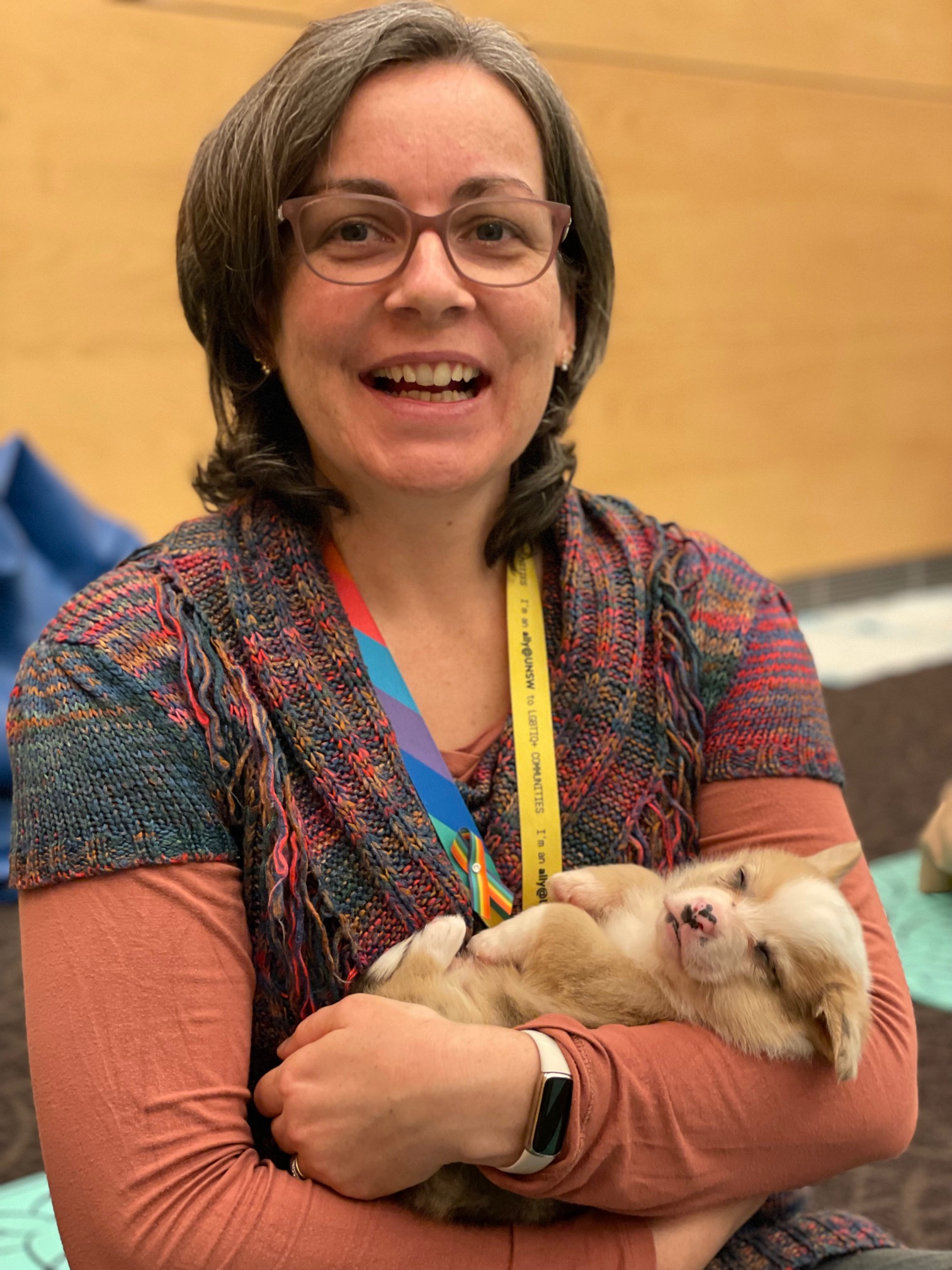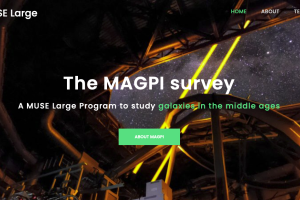
My Expertise
Galaxy formation and evolution
- Galaxy dynamics
- Stellar populations and dynamics of extragalactic globular clusters
- Discrete tracers of galaxy dynamics
Optical astronomy and telescope facilities
- Observational techniques
- Astronomical data reduction and analysis
Fields of Research (FoR)
Cosmology and extragalactic astronomySEO tags
Biography
Welcome to my homepage. My name is Dr Caroline Foster (most people just call me Caro) and I am an astronomer. I have spent hundreds of nights at remote astronomical sites under pristine skies. I collect data from the largest optical telescopes in the world to study the motions and chemistry of stars in galaxies and unravel the history of their formation.
Above: Rainbow over the dome of the Anglo-Australian Telescope in the Warrumbungle...view more
Welcome to my homepage. My name is Dr Caroline Foster (most people just call me Caro) and I am an astronomer. I have spent hundreds of nights at remote astronomical sites under pristine skies. I collect data from the largest optical telescopes in the world to study the motions and chemistry of stars in galaxies and unravel the history of their formation.
Above: Rainbow over the dome of the Anglo-Australian Telescope in the Warrumbungle National Park (NSW, Australia). Admittedly not the best observing conditions, but clouds do make for a photogenic sky!
It was the harmony and beauty of physics and maths that I first fell in love with as a high school student. Physicists measure fundamental constants, derive physical laws from first principles and make solid predictions. Mathematics is the language and foundation of our understanding; it underpins the technological advances of our era.
As a highly idealistic individual, I set out to solve the mysteries of the universe. I was enthralled by the possibility that the many unexplored secrets of deep space could hold the key to unlocking our understanding. After a BSc in physics and mathematics and an MSc in astrophysics from Bishop’s University (Quebec, Canada), I completed my PhD at Swinburne University (Melbourne, Australia) in 2011. I am currently an ARC Future Fellow, Scientia Associate Professor at the University of New South Wales.
Who else am I?
When I'm not busy resolving the mysteries of the universe, I enjoy spending time with my family, crochet, reading, traveling, clarinet, board games, camping and hiking. I am a Christian, neurodivergent and a diversity and inclusion advocate.
My Grants
ARC Future Fellowship 2021, 2021-2025, "Time takes its toll: understanding why galaxies slow down as they get older"; C. Foster, Australian Research Council; $727,000AUD
ARC Discovery Project 2021, 2021-2024, “Beacons in the night:” unveiling how galaxies light up dark matter; C. Lagos, A. Robotham, A. Ludlow, C. Foster, T. Yuan, T. Mendel, A. Tiley, J. Schaye, R. Bower; Australian Research Council; $645,000AUD
ARC Discovery Project 2019, 2019-2021, Ultra-faint signatures of galaxy growth seen through the cosmic haze; L. Spitler, J. Dawson, C. Foster, D. Zucker; Australian Research Council; $330,000AUD
NSERC Graduate Scholarship, 2006-2007, Natural Sciences and Engineering Research Council of Canada, $17,300CA
My Qualifications
PhD in Astrophysics 2007-2011, Swinburne University of Technology Victoria, Australia; Thesis title : The Assembly and Chemical Evolution of Nearby Early-type Galaxies
MSc with Physics Concentration 2005-2007, Bishops University Quebec, Canada; Thesis title : The Size and Distribution of Cosmological Voids in the SDSS
BSc with double major in Physics and Mathematics 2002-2005; Bishops University Quebec, Canada
My Awards
Outreach & Community Engagement Award, 2025, School of Physics, University of New South Wales
Education Impact & Innovation Award, 2024, School of Physics, University of New South Wales
European Southern Observatory Large Program 2019-present; The Middle Age Galaxy Properties with Integral field spectroscopy (MAGPI) survey; Cash equivalent ~$3.4M AUD (https://magpisurvey.org)
Best Thesis University Award 2011, Swinburne University
My Research Activities
My research interests have broadly focused on the formation and chemical enrichment of various structures in the universe. To this end, I have used a variety of techniques across a range of astronomical scales to better understand how the universe formed and how galaxies assembled. My research has led to the development of innovative techniques to exploit 3D spectroscopy data from the largest scales, cosmological voids, down to much smaller structures, globular clusters.
While complex, the process of galaxy formation throughout cosmic time has led to recognisably distinct types of galaxy structures. I am currently using the MAGPI, Hector and SAMI survey data to understand the impact of various physical processes on the structural and dynamical evolution of galaxies.
Current research focus
The spin of galaxies is slowing down and nobody really knows why. This dynamical transformation is predicted by theoretical simulations, but different simulations disagree on its exact causes and their relative importance. Until recently, the data required to map the gas and stars in galaxies during the transition and identify its root causes in galaxies around 3-4 billion years ago were critically lacking. My Future Fellowship project leverages on the Middle Age Galaxy Properties with Integral field spectroscopy (MAGPI) survey, a large programme on the European Southern Observatory's Very Large Telescope. This dataset is designed to directly detect and address this important unknown. By comparing MAGPI with local surveys (e.g. SAMI and Hector) and using redshift surveys such as GAMA and DEVILS, I am identifying the key physical drivers for the morphological and dynamical transformation of galaxies across cosmic time.
Above: Gallery of selected MAGPI galaxies at redshift z~0.3 (~3.5 billion years ago) spanning a range of morphological types. Credit: Foster et al. (submitted to PASA).
Other research interests
My work on the assembly of the Umbrella Galaxy (see image above, Foster et al. 2014, MNRAS, 442, 3544) was the first to spectroscopically target bright tracers such as planetary nebulae, HII regions and globular clusters within the impossibly faint halo substructures in order to measure their kinematics. My research revealed the 3D structure of the shredded stars around NGC 4651. Combined with theoretical modeling, we were also able to identify the remnant nucleus of the infalling galaxy.
Above: The Umbrella Galaxy NGC 4651 from Foster et al. (2014). Image Credit & Copyright: R Jay Gabany (Blackbird Observatories) as it originally appeared in NASA Astronomy Picture of the Day. Cross-hairs in the bottom-left zoom in highlight the nucleus of the likely progenitor galaxy whose stars were shredded in this encounter.
My PhD research concentrated on globular clusters and the unresolved starlight around nearby early-type galaxies. I developed an innovative technique to measure the chemical content of unresolved globular clusters around nearby (within 60 Mpc) galaxies using the near-infrared calcium triplet (Foster et al. 2010, AJ, 139, 1566).
Globular clusters come in two flavours: blue and red, for reasons that are subject to debate. We used data from the 10m Keck telescope on Mauna Kea in Hawaii to: (1) confirm that this `colour bimodality’ in globular clusters is related to a `metallicity bimodality’ (e.g. Foster et al. 2011, MNRAS, 415, 3393; Foster et al. 2010; Usher et al. 2015, MNRAS, 446, 369) and; (2) show that the blue and red globular clusters have distinct dynamics (e.g. Pota et al. 2013, MNRAS, 428, 389; Foster et al. 2011). These discoveries have led to new insights into and avenues for studying the total mass in galaxies (Cortesi et al. 2016, MNRAS, 457, 1242; Pota et al. 2015, MNRAS, 450, 3345), which is critical to our understanding of the distribution and amount of dark matter around galaxies.
As a Masters student, I authored and developed an algorithm that identifies and quantifies the properties of cosmological voids in the universe (Foster & Nelson 2009, ApJ, 699, 1252). These regions devoid of visible matter are the largest structures observed in the universe. My void-finding algorithm has provided new constraints for cosmological models using data from the Sloan Digital Sky Survey (SDSS, Foster & Nelson 2009, Colberg et al. 2008, MNRAS, 387, 933) and is publicly available on this website.
Publication list
My Engagement
Public outreach
Astronomers are fortunate amongst the sciences because astronomy is uniquely relatable. The night sky is accessible to all. Most ancient and modern cultures performed some form of astronomical observation. As a result, astronomy transcends generations and culture. It is a fun avenue for introducing the scientific method and highlight the importance of critical thinking: an essential asset for a freethinking society.
Like most pure research, my work is publicly funded. Hence, I feel a strong commitment to communicate my research more broadly through public talks, visits to amateur astronomy clubs, radio interviews, school visits, social media and press releases.
Sharing my work with the public recharges my life and my research by focussing my perspective on what matters most. Being very idealistic, I regularly wonder whether doing astronomy is a sufficiently purposeful endeavour. Astronomy is usually non-threatening and of universal interest. My research on galaxy formation and evolution will not save lives directly, but scientific literacy will. Learning what the scientific method is and how it works through astronomy can impact someone’s decision to trust vaccines or the latest research on climate change.
Selection of other social engagements
- ABC Radio National Soul Search interview (2024)
- 3D View Helps Us to Understand How Galaxies Formed and Evolve (Article for The Conversation, 2017)
- I sporadically blog about topics at the intersection of science and faith
My Teaching
My journey as a teacher began in 2003 as a glider instructor and air cadet officer in the National Defense of Canada. Since then, I have transferred many of the leadership and teaching skills I learned during my 4 years in the National Defense into the university context. While the teaching style differs for high school and university students, my goal has always been to guide students to develop the ability to independently direct and take ownership of their own learning. Developing the necessary skills to learn independently is an important aspect of university training. The ability to learn and make progress even when a path has not yet been forged is a highly sought-after and transferable skill in innovation-driven fields. As such, I encourage my students to formulate questions, look for answers and critically evaluate those answers.
Above: Dr Foster lecturing on galaxies and cosmology at UNSW.
University teaching experience
- I was awarded the School of Physics's "Education Impact & Innovation Award" (2024)
- I have developed (2023), convened and taught (2023 & 2024) the PHYS3116: Galaxies & Cosmology course at UNSW;
- I co-designed and co-taught the AAO's Observational Techniques Workshop (2014 & 2016).
 https://orcid.org/0000-0003-0247-1204
https://orcid.org/0000-0003-0247-1204
